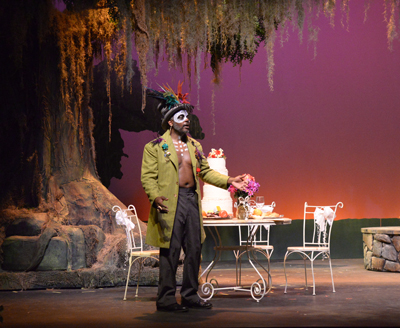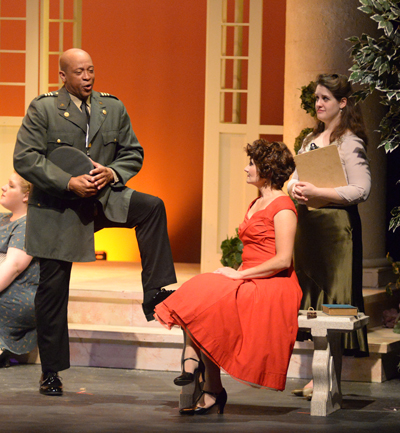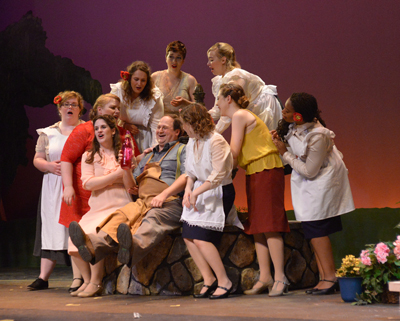by Daniel Hathaway
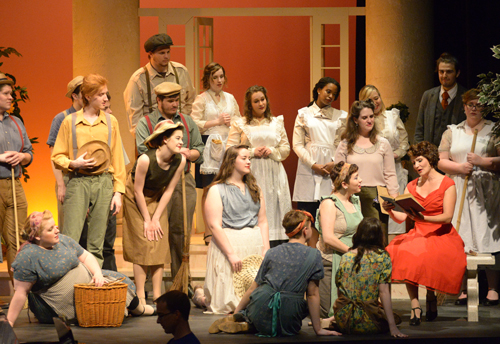
Elixir was originally set in a Basque village. Stage director Marla Berg chose to move the setting to the Louisiana Bayou, where the character of Dr. Dulcamara became a voodoo witch doctor. In addition to inspiring some colorful stage settings, this was a prescient choice. The Knight Center isn’t air-conditioned, and nature helpfully mirrored the scenario by blanketing Hudson in heat and humidity on Saturday evening. Spanish moss dangling from the trees seemed right at home, and the audience could join the cast in mopping their collective brows.
Soprano Marian Vogel was splendid as Adina, the wealthy estate owner who sets the action in motion by reading the story of Tristan and Isolde aloud, poking fun at Isolde’s devotion. Petite but commanding, Vogel spun out her frequently ornate lines with technical ease and an bright, alluring tone. She never tired, though Donizetti saved some of his most challenging vocal licks for late in the show.
Tenor Timothy Culver was engagingly funny as Adina’s bumbling suitor, but he never overplayed Nemorino’s character, even in his hilarious drunken scenes. (The elixir is actually cheap Bordeaux wine that inspires more inebriation than infatuation.) He sang his daunting vocal lines with confidence and style, and his second act “Una furtiva lagrima” was a show-stopper, even in English.
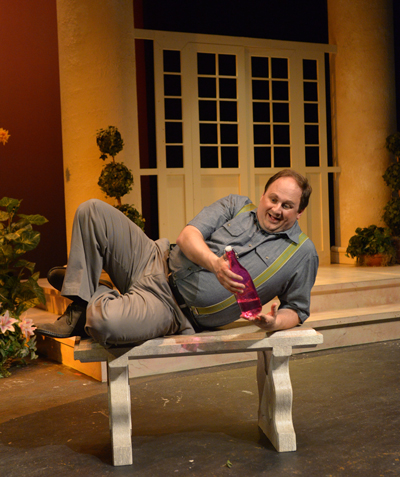
Baritone Jonathan Stuckey acted and sang Dulcamara with élan, even if his patter songs were a bit difficult to understand — and were sometimes just a hair behind the rest of the cast.
Ann Giancola was suitably officious as Adina’s housekeeper, Gianetta (she carried a clipboard through most of the first act), and her singing was supple and clear. Though only credited as a “Silent Actor,” Seth Harbert slipped out of the chorus during the first act, later to reappear (hilariously) in drag as Dulcamara’s sidekick.
Opera without an orchestra can sound like a dress rehearsal, but Nightingale Opera brought a Steinway grand in for the occasion. Pianist and assistant music director Richard Jeric provided a colorful and flawless account of the orchestral score. Music director John Simmons led the show with an adroit sense of pacing.
Framed by Jeff Ridenour’s evocative sets, decked out in Maureen Thomas’s attractive costumes and brightly lit by Marcus Dana, the 25-member chorus, made up of Nightingale and Western Reserve Academy Young Artists and prepared by Richard Jeric, looked and sounded terrific.
Rumor has it that Western Reserve Academy plans to install climate control in the Knight Center by next summer when Nightingale is set to perform there again. Good news for the audience, but especially for singers in costumes and makeup. Ultimately, any personal discomfort was forgotten by the end of Saturday’s performance. The large crowd gave the cast a rousing ovation.
Photos by Michael’s Portrait Design.
Published on ClevelandClassical.com June 19, 2015.
Click here for a printable copy of this article



